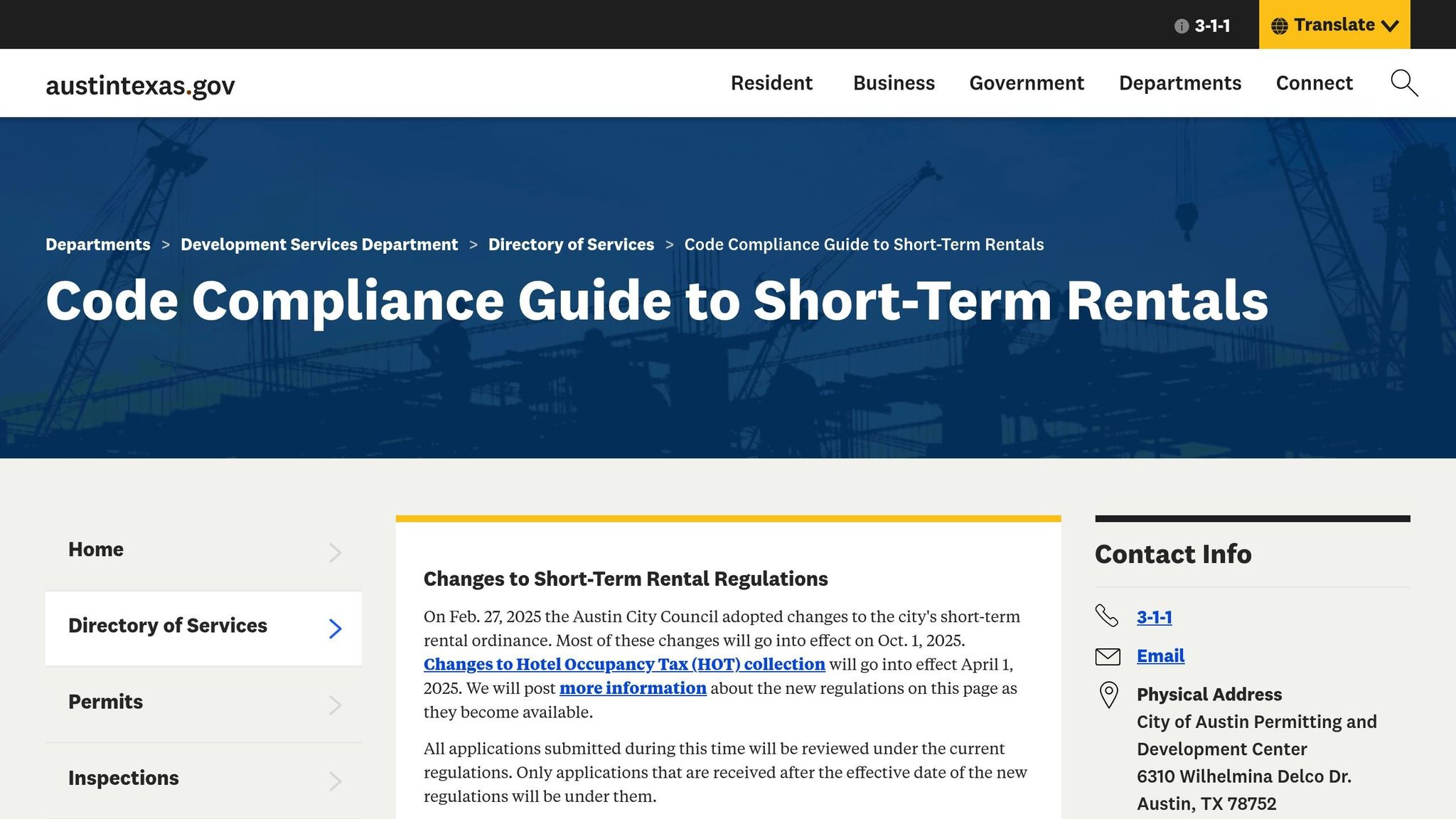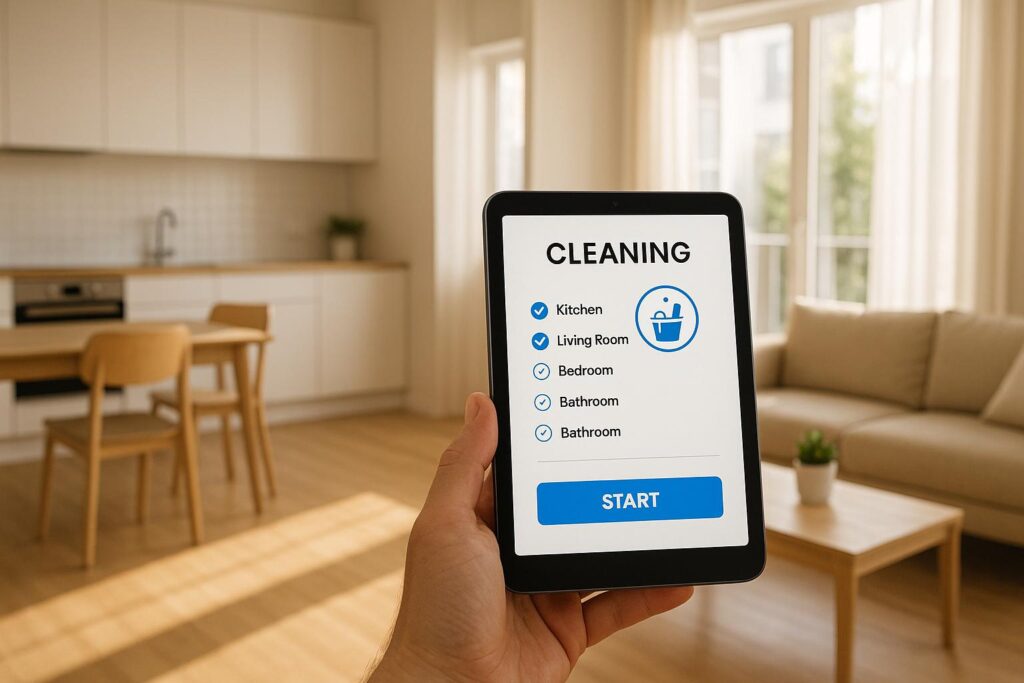Managing a short-term rental in Austin? Here’s what you need to know about taxes in 2025:
- Hotel Occupancy Tax (HOT): Applies to rentals under 30 days. Includes state and local taxes on room rates and mandatory fees (not on refundable deposits or optional charges).
- New 2025 Rules: Booking platforms now collect and pay taxes directly. Filing and payment processes have been simplified under updated Title 4 Code.
- Host Responsibilities:
- Obtain a short-term rental license.
- Register with state and local tax authorities.
- Collect taxes from guests (unless platforms handle it).
- File returns and remit taxes on time.
- Tax Exemptions: Guests staying 30+ days may qualify for exemptions. Keep proper documentation.
Stay compliant by tracking income, using tax tools, and keeping records for at least four years. Following these rules ensures smooth operations and avoids penalties.
Tax Rates and Structure
State and City Tax Rates
If you’re a short-term rental host in Austin, you’ll need to handle hotel occupancy taxes at both the state and city levels. The Texas Comptroller oversees state tax collection, while the City of Austin manages local taxes. How often you need to remit taxes – whether monthly, quarterly, or otherwise – depends on the total amount you owe. Be sure to check official resources for the most current tax rates and rules.
Now, let’s look at what charges these taxes apply to.
What Charges Are Taxable
Understanding what’s taxable is key to staying compliant. Taxes generally apply to room rates and any mandatory fees, but refundable deposits and optional fees are not taxed. If you bundle fees together, those may also be fully taxable.
For properties used for both short-term and long-term rentals, keep separate records for each type. For the latest compliance tips, refer to official sources or reach out to the Austin Local Team.
How to Meet Tax Requirements
Getting Your Rental License
Before you can start collecting taxes, you’ll need a short-term rental license from the City of Austin. To get this, apply through the city portal, provide proof of insurance, and complete the required safety inspections. Make sure to renew your license on time and include the license number in all your listings.
Required Tax Registrations
Once you have your license, you’ll need to register for the necessary tax accounts:
- Sign up with the City of Austin to get your local hotel occupancy tax ID.
- Register with the Texas Comptroller’s Office to handle state tax collection.
Keep these registration numbers handy for tax filings and communication.
Tax Collection and Payment
After registering, follow these steps to handle taxes properly:
- Clearly list tax charges on invoices and booking confirmations.
- Maintain detailed records of all tax collections.
- File local and state tax returns on schedule.
- Keep supporting documents like guest receipts and exemption certificates.
Check if your booking platform automatically collects certain taxes. For any taxes not covered, you’ll need to manage them yourself.
Texas Short-Term Rental Laws: Host’s Guide to Success
sbb-itb-4c99469
2025 Tax Rule Changes
Starting in 2025, new regulations aim to make tax management easier for short-term rental hosts in Austin.
Platform Tax Collection Rules
Beginning in 2025, major booking platforms in Austin are required to automatically collect and submit state and local hotel occupancy taxes on behalf of short-term rental hosts. This means hosts won’t need to handle these taxes directly when using these platforms.
Title 4 Code Updates
Austin’s City Code, Title 4, has been updated to simplify tax compliance for hosts. These updates include:
- More straightforward tax return filing processes
- Adjusted payment deadlines
- Longer record-keeping requirements
- Changes to late payment penalties
These revisions are designed to reduce the administrative work for hosts. It’s important for hosts to familiarize themselves with these changes to stay compliant.
Solutions to Common Problems
Here are practical steps to tackle issues related to licensing, tax exemptions, and reporting.
Preventing License Violations
Avoid penalties by following these steps:
- Display your current rental license prominently on the property.
- Set calendar reminders for license renewal deadlines.
- Keep accurate occupancy records to ensure smooth tax filings.
- Conduct regular inspections to stay compliant with regulations.
Common mistakes include outdated contact information and exceeding occupancy limits. To help, the Austin Code Department offers a digital compliance checklist via their online portal, making it easier to stay on top of requirements.
Understanding tax exemptions is another key aspect of staying compliant.
Tax Exemption Rules
Guests staying 30 consecutive days or more may qualify for tax exemptions. Ensure you have:
- A written lease agreement showing the stay is 30 days or longer.
- Proof of payment covering the entire stay period.
- A completed Texas Hotel Occupancy Tax Exemption Certificate (Form 12-302).
Keep these records for at least four years, as required by the 2025 Title 4 Code updates. If a guest extends their stay beyond 30 days after initially booking, refund any hotel occupancy taxes already collected.
Once exemptions are handled, focus on simplifying your tax reporting.
Making Tax Reports Easier
Follow these steps to streamline your tax reporting process and stay compliant with Austin’s regulations:
- Use short-term rental accounting software to track income and expenses.
- Keep separate bank accounts for your rental income.
- Download and archive monthly revenue reports from booking platforms.
- Log non-platform bookings in a dedicated ledger.
- Regularly review taxes collected by platforms.
- Calculate taxes for direct bookings yourself.
- Verify all tax exemption documentation is accurate and complete.
- Submit tax returns no later than the 20th of each month.
- Consider automated tax tools for non-platform bookings.
While booking platforms often handle tax collection, ultimate responsibility for compliance rests with the host.
Summary
Here’s a quick rundown of the main points:
- Obtain and display your short-term rental license and register with both state and local tax authorities.
- File your tax returns on time, ensuring all rental income is included.
- Keep detailed records of fees, exemptions, and other relevant information to back up your filings.
- Stay informed about changes to tax collection rules that could impact how you collect or pay taxes.
While digital tools can help simplify the process, staying compliant is ultimately up to you. Following these steps will help keep your rental business running smoothly.






